Shut in by quarantine measures for the new coronavirus, Carmen Borges shares her small apartment in Caracas with her hustand, two daughters and, of late, a squirrel pup rescued by a neighbor.
The animal scurries across the kitchen floor and sleeps on the balcony in a nest improvised from a white towel. She feeds it by hand, and for a few weeks gave it human milk from her daughter, who recently gave birth.
The 50-year-old reiki therapist said she hopes the animal can learn to feed itself and be released outside — like the small, injured owl another neighbor had rescued and Borges cared for as it recuperated.
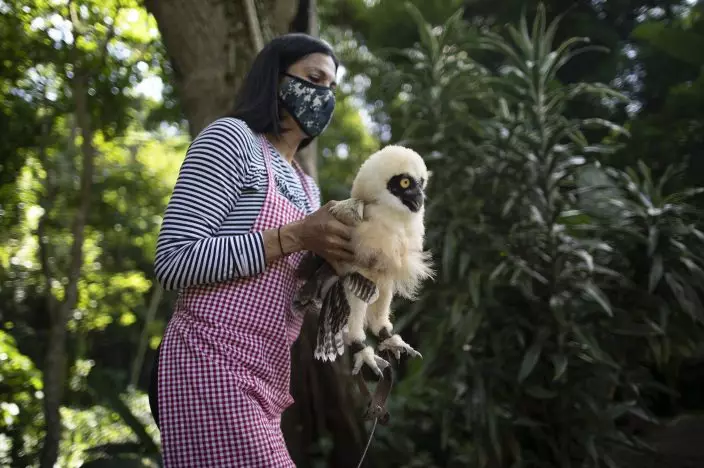
The veterinarian and environmentalist Grecia Marquis cares for a spectacled owl who fell from a tree a month ago dehydrated and underweight, in Caracas, Venezuela, Monday, Sept. 21, 2020. Marquis, founder of the Feathers and Tails in Freedom foundation, said that given the large number of calls from people reporting cases of injured animals, she decided to reopen her center in May, after closing it between March and April due to the quarantine imposed to help curb the spread of the new coronavirus. (AP PhotoAriana Cubillos)
She's among a group of Venezuelans caring for lost or injured animals at a time when reduced human presence in the streets has lured some creatures into perilous encounters with an urban environment in one of the world's most biodiverse countries.
Workers at the government's Mision Nevado and the independent Feathers and Tails in Freedom Foundation say they've seen increasing numbers of animals brought in for help.
Veterinarian Grecia Marquís, who directs the foundation, said an “impressive” number of animals — 20 — have arrived since it reopened in June after a two-month closure due to the pandemic.
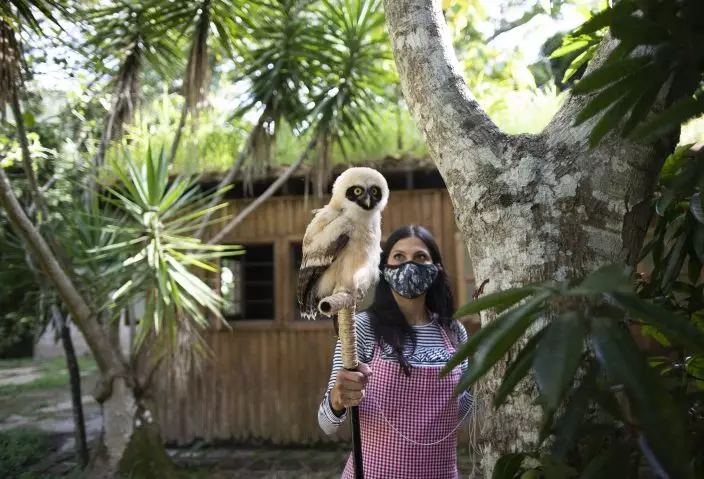
A spectacled owl, recovering from dehydration, roosts on a bird perch held by veterinarian and environmentalist Grecia Marquis at the Feathers and Tails in Freedom foundation, in Caracas, Venezuela, Monday, Sept. 21, 2020. Some of the animals that have suffered accidents in Caracas and surrounding areas in the midst of the the new coronavirus pandemic have managed to survive thanks to the help of passersby and drivers who have taken them to the facilities dedicated to animal care such as the Feathers and Tails in Freedom foundation. (AP PhotoAriana Cubillos)
They've included a bat falcon injured in a collision with high-tension lines, a rusty-barred owl that needed a wing operation and several other owls, falcons and sloths, as well as an anteater.
Caring for them is a challenge in a country that was struggling with the world's steepest economic decline even before the pandemic bit.
Marquís helps finance the foundation by selling some of her paintings and gets private contributions. She also asks those who bring the animals for a little money for their medicines.
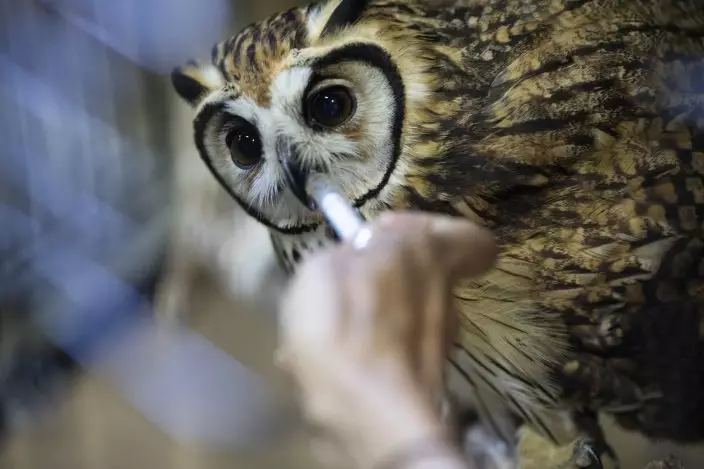
The veterinarian and environmentalist Grecia Marquis uses a syringe to give water to an owl at the Feathers and Tails in Freedom foundation, in Caracas, Venezuela, Monday, Sept. 21, 2020. The owl who was found two months ago with a wing injury is now recovering after surgery. (AP PhotoAriana Cubillos)
Some of the patients came by way of paramedic Ángel Padilla, who picks up injured animals — such as the bat falcoln — as well as crash victims.
“With the quarantine or without the quarantine, I'm watching out for my animals," he said.
Borges, meanwhile, likes to spend time on the roof of her 12-story apartment building sharing seeds and bananas with a squaking bunch of flamboyantly colored guacamayas, an old vulture and a one-legged falcon.
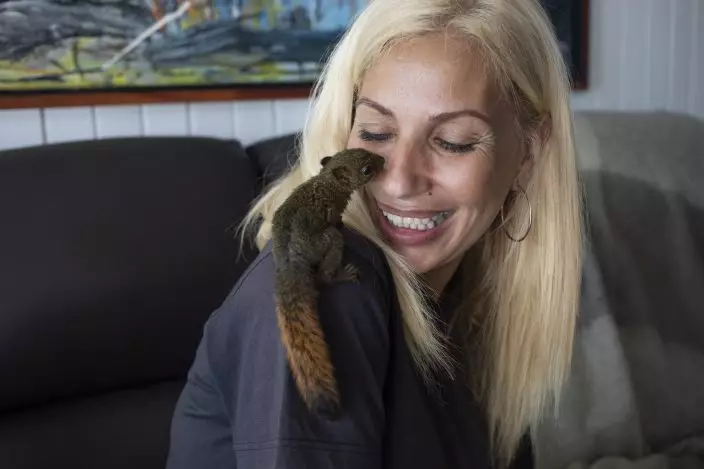
Carmen Borges, a reiki therapist, smiles at a baby squirrel perched on her shoulder in her apartment in Caracas, Venezuela, Friday, Sept 11, 2020. Borges converted her small apartment, where she lives with her husband and two of her three daughters, into a shelter for a dray of baby squirrels who were rescued from the middle of a street by a neighbor. (AP PhotoAriana Cubillos)
She said they've brought her “great happiness” despite the pandemic restrictions on movement.
“Now it's better because I have more time to be in my home ... and with them, it's even better," she said.
Fabiola Sánchez is on Twitter: https://twitter.com/fisanchezn
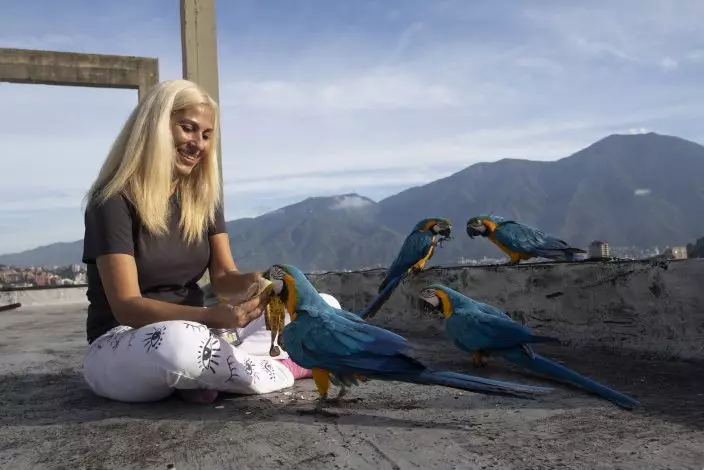
Carmen Borges a reiki therapist, feeds a banana to a macaw as she sits on the rooftop of her apartment building, in Caracas, Venezuela, Friday, Sept. 11, 2020. The confinement of millions of people in their homes for more than six months due to the quarantine imposed to help curb the spread of the new coronavirus, has allowed many wild animals to regain part of the spaces that humans had invaded, but it has also exposed them to colliding with electric poles, getting entangled in power lines or stray in urban areas, say environmentalists and rescuers. (AP PhotoAriana Cubillos)
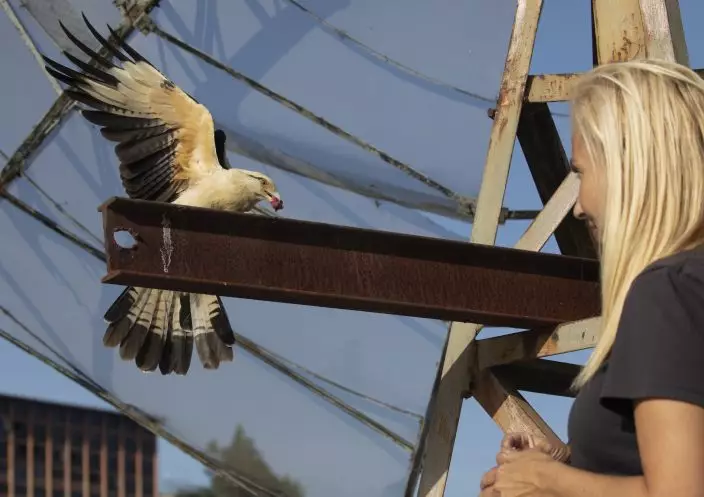
Carmen Borges, a reiki therapist, feeds chunks of raw meat to a one-legged hawk on the rooftop of her apartment building, in Caracas, Venezuela, Thursday, Sept. 17, 2020. The confinement of millions of people in their homes for more than six months due to the quarantine imposed to help curb the spread of the new coronavirus, has allowed many wild animals to regain part of the spaces that humans had invaded, but it has also exposed them to colliding with electric poles, getting entangled in power lines or stray in urban areas, say environmentalists and rescuers. (AP PhotoAriana Cubillos)
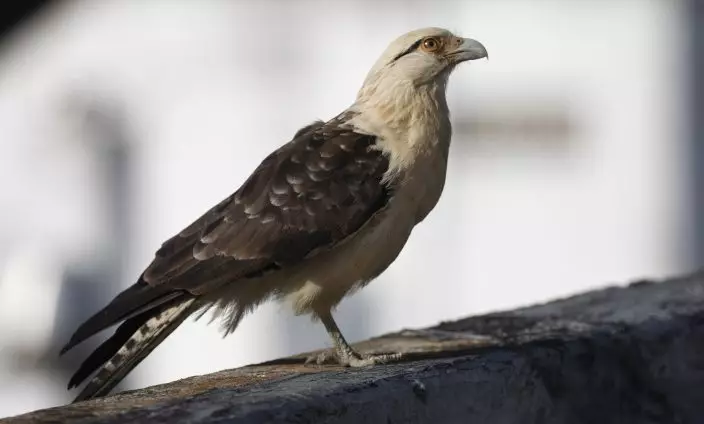
A one-legged hawk waits to be fed by Carmen Borges, on the rooftop of her apartment building in Caracas, Venezuela, Thursday, Sept 17, 2020. Venezuela enjoys the privilege of being one of the countries with the greatest biological diversity on the planet thanks to its eleven different ecosystems that allow it to have a great variety of flora and fauna, some of which are at risk of extinction due to indiscriminate hunting and illegal trafficking that has not stopped despite the quarantine due to the new coronavirus pandemic, say environmentalists. (AP PhotoAriana Cubillos)


